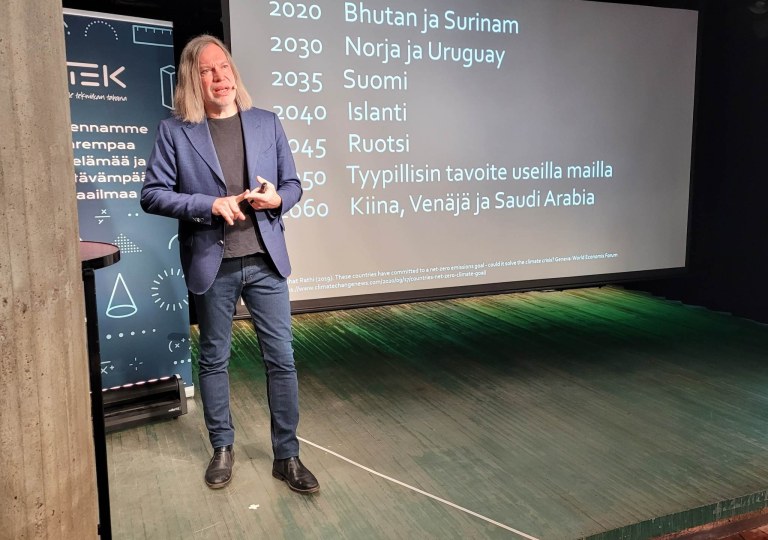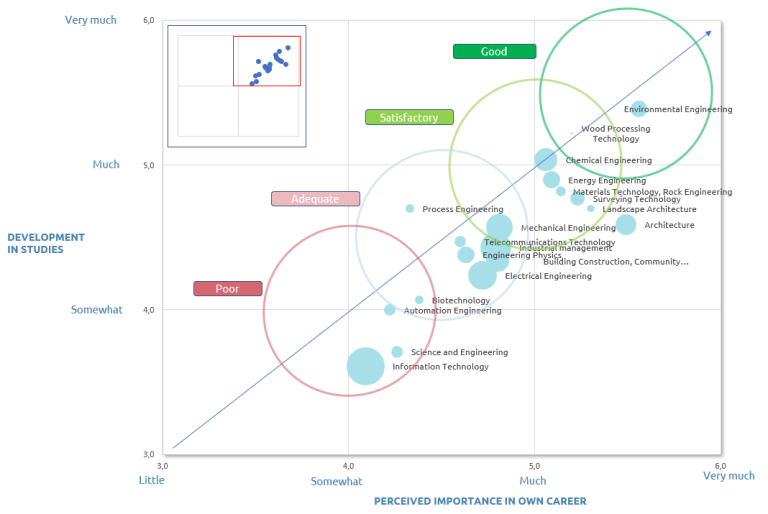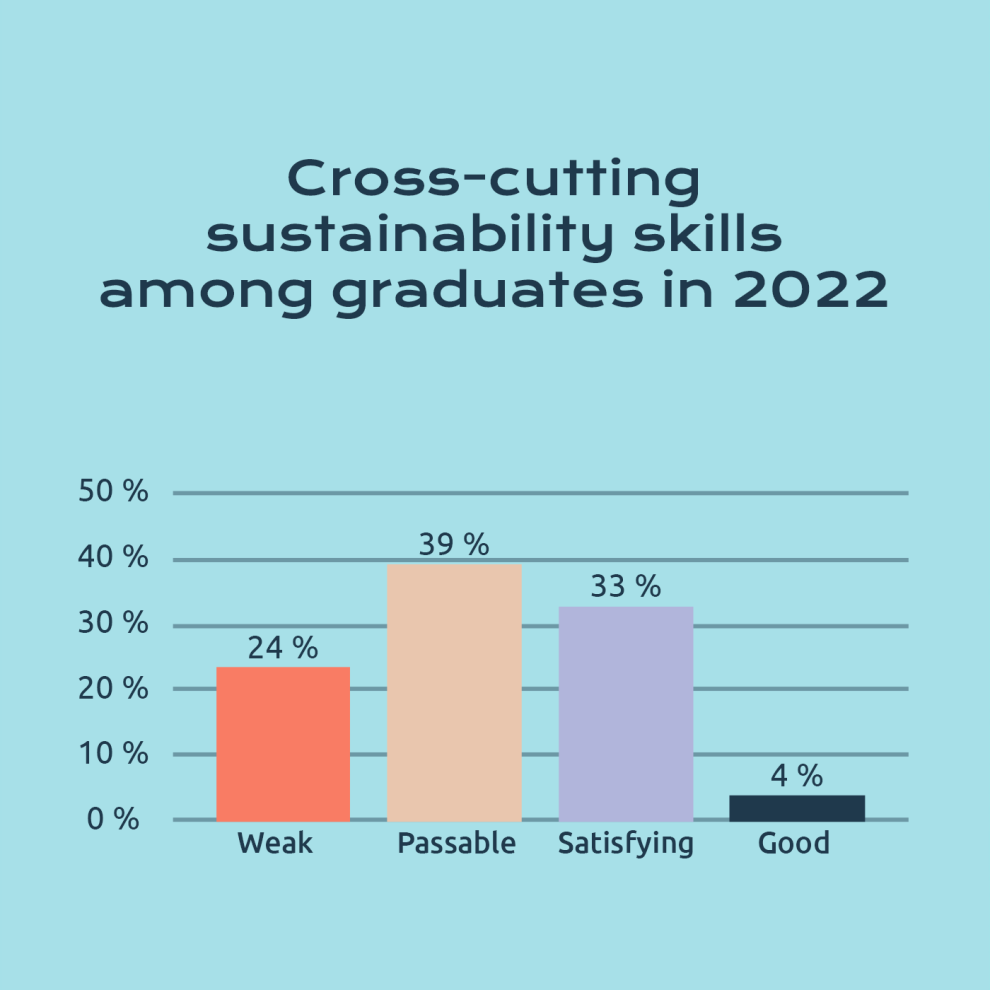
The publication event of the Graduate Survey, conducted by the Academic Engineers and Architects in Finland TEK and Finnish universities in the field of technology, centred around the theme of engineering skills in a time of environmental crises.
“For decades, we have known that we must stop climate change, but we have not yet done enough or tackled the issue quickly enough to achieve this goal. We are so accustomed to this slow pace that we suffer from what is the opposite of speed blindness, crawling blindness,” said Advisor on Engineering Sustainability at TEK Jussi-Pekka Teini.
“The change will eventually be so rapid, that it will no doubt surprise even me.”
This is not a new topic for tech professionals. TEK’s Code of Honour (in Finnish), which gathers together key ethical guidelines in the field of technology, was revised as part of TEK’s 100th anniversary almost 30 years ago. The Code of Honour states: “As an expert in technology, I help build roads to the future. I also hold a responsibility to future generations to develop and apply technology. I take sustainability requirements into consideration in my work.”
Professor Arto O. Salonen commended the contents of the Code of Honour. Salonen also asked the audience to imagine what a good world would look like and how we could make this happen.
“Speed on its own is extremely harmful, if we are going in the wrong direction. What if we are doing things that do not take us towards something good? The tough question in society is, indeed, what is this good that we should pursue.”
The article continues below the photo.

According to Salonen, work is starting to gain a new meaning in addition to productivity and efficiency. What is becoming important is how work can be used to address social and planetary problems. More and more, we hear people asking questions of how a particular job tries to solve the problems that weaken the outlook for the future. This makes jobs meaningful.
“We have noble goals that are worth pursuing, even if it isn’t clear whether we will ever reach them,” said Salonen.
Science, Salonen believes, is the best way of explaining and understanding the world and reality, but it needs to be accompanied by art, which questions and presents idealistic views. We need this in order to have attractive goals to pursue.
“We need coders, but above all, we need people who tell us what kind of world we should be building with code,” said Salonen.
We need a broad set of skills and more engineers
So, what skills do engineers need to make environmental goals achievable? This question was addressed in his presentation by TEK’s Advisor on Engineering Sustainability Jussi-Pekka Teini, referring particularly to two different reports on the topic: The Effects of the Green Transition to the Employment and Educational Requirements of Engineers in Finland by Engineers Finland and Towards A Circular Economy by the Association of Nordic Engineers.
“There is still a need for so-called hard engineering skills, that is, STEM skills. In fact, the growing complexity of issues further increases the importance of mathematical skills. But many other skills are also required, such as systems thinking, digitalization and data skills, communication skills, interdisciplinarity and the ability to update your knowledge,” says Teini.
“The quantitative need for engineering skills is also growing, as shown by all reports. To meet this need, we would have to produce about 1.5 times more graduates, but there are plenty of other options as well, such as higher student intake, improving completion rates, attracting international talent and continuing education,” says Teini.
Level of sustainability skills varies between fields of education
TEK’s Analyst Arttu Piri described the results of the latest TEK Graduate Survey 2022 and what they tell us about the current level of sustainability skills among graduates in technology. The annual survey conducted by TEK and Finnish universities in the field of technology examines the employment situation of recent graduates and their thoughts about their studies. In 2022, about 3 000 students with a master’s degree in technology or architecture graduated in Finland, and 61 percent of them answered the survey.
The article continues below the image.


Arttu Piri used the phrase “cross-cutting sustainability skills” to describe the combination of the perceived importance of sustainability for one’s own career and how well teaching has developed the skills associated with sustainable development. This cross-cutting nature is good or satisfactory for 37 percent, but adequate or poor for 63 percent of last year’s graduates.
“So my question is, is this the kind of situation we are happy with?” Piri asked the audience and received several negative answers.

The survey has examined sustainability skills for a long time, which provides perspective to the development of the situation.
“We can fortunately see positive changes in many fields of education both in terms of the development of sustainability skills and their perceived importance. However, the situation in information technology is particularly concerning. Future solutions rely on IT, and already one fifth of graduates represent this field. However, both perceived importance and development in studies are poor for IT graduates,” Piri points out.
Comments called for social sustainability
Professor of Wood Materials Science and Technology Antti Haapala from the University of Eastern Finland talked about the meaningfulness of working in technology and whether we are able to communicate its opportunities properly to encourage people to pursue studies in the field.
Jenny Lehtomäki from Gaia Consulting highlighted some of the everyday changes related to sustainable development that can already be seen in business. In construction, for example, the new Land and Building Act will make climate surveys obligatory, the public sector has a climate plan obligation and various circular economy solutions have already become a visible part of business in the textile industry.
Chair of the Board at Aalto University Student Union AYY Ida Parkkinen noted that their goal is to integrate sustainability skills into all the study programs at Aalto University. Parkkinen also talked about students’ and graduates’ ability to cope. Problems with mental well-being and coping issues are also evident in the results of the Graduate Survey, which reveal that no less than 37% of tech graduates were constantly or often worried about coping during their studies. The percentage has increased from the previous survey. In addition, Parkkinen discussed how the sustainability transition and green transition should be carried out so that they are socially sustainable and just.
TEK's network of sustainability educators
Academic Engineers and Architects in Finland TEK invites all teachers, administrative staff and stakeholders who are interested in sustainable development in university education in technology to join a network of sustainability educators.
Where did the idea of a network come from, TEK’s Advisor on Engineering Sustainability Jussi-Pekka Teini?
“Universities have various sustainability networks already, but as far as I know, there isn’t one for people in the field of technology. Tech professionals work directly with solutions that determine our success in the sustainability transition. We hope that this network will help us bring together the people who are interested in and work with this topic.”
TEK has helped produce several reports that examine engineering skills in the green transition. This is one of the reasons why it felt natural for TEK to build a network to help educators further incorporate the topic in their teaching.
“TEK’s motivation for this is, of course, to save the world, but we also believe that the development of various sustainability solutions will improve the labour market opportunities of our members. Work will also become more meaningful and this could have a positive impact on terms of employment in general,” says Jussi-Pekka Teini.
The network aims to organize webinars or in-person events 1–3 times a year on the topic of integrating sustainability themes in education in technology. Belonging to the network does not bind you to anything. The network is also useful for sharing information, for example about upcoming events and reports on the topic.
What topics does TEK study?
We at TEK are constantly researching the field of technology: employment, salaries, equality, and coping with work or studies, for example. We have studied and published information on many themes for years – you are welcome to examine and compare the results using, for example, time series visualizations. Read more about our research: www.tek.fi/research